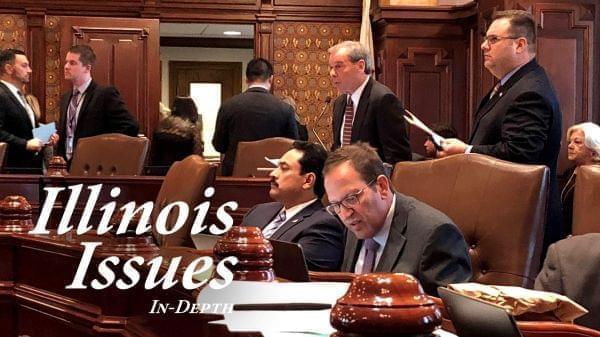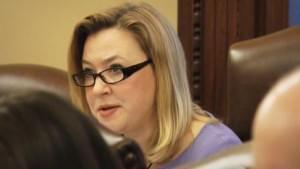Illinois Issues: Legislative Checklist - Veto Session

During the veto session debate, Senate President John Cullerton (back) advocates for HB 137 — a proposal to extend the statute of limitation on complaints made to the Inspector General in light of a backlog of complaints. Daisy Contreras/NPR Illinois
An open letter alleging rampant sexual harassment in Illinois state government and specific accusations against one Senate leader dominated discussion during the fall veto session. The discussion prompted both chambers to approve new rules aimed at curbing troubling behavior, which Gov. Bruce Rauner signed Thursday. Legislators also found time to override nearly a third of Rauner's vetoes. Below is a recap of action in the legislature so far this year.
Sexual harassment
Senate Bill 402 The law prohibits sexual harassment by state officers and employees, makes sexual harassment training mandatory for legislators and lobbyists, and establishes a hotline for anyone in the state to report such cases via phone or website. It amends the State Officials and Employees Ethics Act, the Lobbyist Registration Act and the Illinois Human Rights Act. Anyone found in violation of the rules could be fined up to $5,000 per offense, as well as be subjected to other disciplinary action or dismissal. These fines would be separate from any penalty decided on by the Legislative Ethics Commission. The law requires all government units to establish their own ordinance or resolution policy to prohibit sexual harassment. The sponsors are House Speaker Michael Madigan and Senate President John Cullerton.
House Bill 137 The law extends the statute of limitations on complaints, including about sexual misconduct, dating back to 2014 that haven't been investigated by the legislative inspector general. It takes effect immediately.
Overridden By The Legislature
Debt Transparency Act
HB 3649 The governor vetoed the measure, but the legislature overrode it during the November session with bipartisan support. Comptroller Susana Mendoza advocated for the legislation as a way to force state agencies to report unpaid bills every month—as opposed to once a year, as is currently done. Rauner said that such requirements are comparable to “micromanaging” state agencies, which would be burdensome and expensive. But the House sponsor, Rep. Fred Crespo, a Democrat from Hoffman Estates, said it’s necessary to help the comptroller’s office by having the real-time status of unpaid bills and the interest they are accumulating. The Senate sponsor was Democratic Sen. Andy Manar of Bunker Hill. The law does not define any noncompliance penalties, but Mendoza says she hopes agencies will be encouraged to participate as soon as possible.

SB 1351 has new reqirements for student loan providers.
Student loan borrower protections
Senate Bill 1351 The law will require loan service providers be licensed by the state and to offer more information on loan repayment options and accounting to student borrowers. Rauner wrote in his veto message that the added regulations would complicate an “already complex student loan process.” Biss, a Democrat from Evanston, and Democratic Rep. Will Guzzardi from Chicago sponsored it. When the law goes into effect at the end of 2018, an ombudsman will be assigned to oversee any student-borrower complaints against loan service providers.
Failed Overrides
Right to work
SB 1905 The measure would have allowed unions to set up collective bargaining zones and prohibited individual workers from opting out of paying bargaining fees in a unionized work zone. In his veto message, Rauner wrote that this approach hurts businesses and the workers’ freedom to choose. Instead, the governor supports “right-to-work zones,” where unions can coexist with workers that choose to opt out. The bill was brought up for a veto override but fell one vote short in the House. The House sponsor was Rep. Martin J. Moylan, a Democrat from Des Plaines and the Senate sponsor was Sen. Ira Silverstein, a Democrat from Chicago.

State Rep. Anna Moeller, an Elgin Democrat, pushed for a bill that blocks employers from asking potential hires for salary history. Some believe the ban would help bridge the gender pay gap. Gov. Bruce Rauner vetoed the measure.
Salary history
HB 2462 During the November veto session, state Rep. Anna Moeller, a Democrat from Elgin, obtained the needed votes to override the governor’s veto in the House with bipartisan support, but fell seven votes short in the Senate. The bill would have prohibited employers from screening applicants on the basis of wage or salary history. Some argue the gender wage gap could be further bridged if salary history is left out of a screening process. Opponents argue that other forms of screening could be implemented to avoid underpaying women in jobs where men normally make much more. In his veto message, the governor wrote his support of equal pay for equal work, but suggested Illinois could mirror the Massachusetts’ No Salary History law, which allows asking for previous compensation under certain circumstances.
Vetoed By The Governor
$15 minimum wage
SB 81 The legislature did not attempt to override Rauner’s veto. The bill intended to increase the state’s minimum wage to $15 an hour over several years. The current Illinois minimum wage is at $8.25 an hour. It has remained unchanged since 2010. The bill would have increased the amount to $9 an hour in January, then gradually increased it each year until it hit $15 in 2022. In his veto message, the governor wrote that a 10 percent increase to the minimum wage would hurt workers instead of helping them. He suggested Illinois needs “to be seeking comprehensive solutions that grow the economy and the number of jobs available where individuals can train, grow and attain better lives for themselves and their families.” The measure was sponsored by Sen. Kimberly Lightford, a Maywood Democrat, and Guzzardi, a Chicago Democrat.

Women march in Springfield earlier in 2017.
Wage theft
SB 1720 This bill, vetoed by the governor, would increase the penalties for employers who repeatedly engage in wage theft. Sponsors failed to get an override during the veto session. The measure would have added restrictions for repeated wage theft offenders in contracting with the state. It also would have upped the charge for theft amounts of $5,000 or less from the Class B misdemeanor, crimes such as littering and trespassing, to a Class A misdemeanor, crimes such as driving under the influence and damaging property. Under Illinois statute, a Class A misdemeanor can include a sentence of up to a year in jail with a maximum fee of $2,500. Unpaid wage amounts of more than $5,000 would have increased the penalty from a Class A misdemeanor to a Class 4 felony, crimes such as stalking and aggravated assault. Under statute, a Class 4 felony can include a sentence between one and three years.
In his veto message, Rauner said that every worker should have legal entitlement to their earned wages, and that penalties should exist. “However, there is little evidence that the current system of making failure to pay wages a misdemeanor requires a major shift to making it a felony,” he wrote. Biss, a Democrat from Evanston, sponsored this bill. The House co-sponsors are Chicago Democrat Rep. Lisa Hernandez and Urbana Democrat Rep. Carol Ammons. Supporters say they’re undecided on whether to reintroduce the measure next session.
Signed By The Governor
Abortion
HB 40 This law allows abortion to be covered by Medicaid and state-employee health insurance. It also strikes down Illinois’ so-called trigger law. Written in the 1970s, the trigger law would have made abortion illegal in Illinois if Roe v. Wade was overturned. Rauner signed it despite rallying from pro-life advocates who met with the governor over several months. The governor had initially indicated his intention to veto it, even after campaigning as an anti-abortion candidate. But after holding meetings with women from across the state, the governor said he decided that access to women’s health care should not be limited by economic status. Democratic Rep. Sara Feigenholtz of Chicago proposed the bill. The Senate sponsor was Sen. Heather Steans, a Chicago Democrat. The law takes effect January 1, 2018.
Sexual crimes against children
SB 189 This legislation eliminates statutes of limitation for felony sexual crimes against children. Sponsored by Democratic Sen. Scott Bennett of Champaign, the legislation gives victims the opportunity to file charges at any time after the assault has taken place. The law does not apply to cases where the statute of limitation has expired, but does apply to all other cases where the legal time limit is still valid. Previously, Illinois’ statute of limitations for sexual crimes against children was 20 years after the age of 18 — or until the victim is 38 years old. Democratic Rep. Michelle Mussman of Schaumburg is the House sponsor. The law went into effect August 11.
LGBT panic defense
SB 1761 Democratic Sen. Daniel Biss of Evanston sponsored this law that prohibits a defense for violent assault or murder based on a victim’s sexual orientation or a nonviolent sexual advance. The “gay panic defense” and “transgender panic defense” was last used in the state in 2009, when an Illinois man was acquitted of first-degree murder. Proponents want to ensure that this defense will not be used in Illinois again to mitigate or eliminate murder charges. The House sponsor was Rep. Litesa Wallace, a Democrat from Rockford. The law goes into effect January 1, 2018.

SB 1884 and SB 1882 are animal welfare bills signed into law by the governor.
Animal welfare
SB 1884 The law will require public research institutions in Illinois to have an adoption policy in place for dogs and cats used in testing, rather than euthanizing them. It was sponsored by Aurora Democratic Sen. Linda Holmes and Democratic Rep. Laura Fine of Glenview. The law goes into effect January 1, 2018.
SB 1882 This law requires the disclosure that the cat or dog was micro-chipped on sale documents. It also prevents any pet shop owner or animal seller from obtaining a cat or dog from someone who has previous federal law or regulation violations falling under the U.S. Department of Agriculture. The bill was sponsored by Democratic Sen. Michael Hastings of Orland Hills. An identical House bill, HB 2824, was sponsored by Democratic Rep. Jerry Costello of Smithton. The law went into effect August 24.
Bail reform
SB 2034 This law, signed in June, allows those charged with misdemeanors, minor offenses or some felonies who can’t immediately afford bond, to attend a second bail hearing. At this hearing, the court decides whether the lack of bail money is sufficient reason to keep a person incarcerated. The court can lower the amount or allow the person to leave under certain conditions. Those in this category could also receive a $30-credit toward bond for every day spent in jail. The House sponsor was Rep. Elgie R. Sims Jr., a Democrat from Chicago and the Senate sponsor was Democratic Sen. Donne Trotter of Chicago.
Women in prison
HB 3904 Sponsored by Chicago Democratic Rep. Juliana Stratton, the law creates a women’s division in the Department of Corrections that would oversee women’s correctional institutions. Under the law, the department director will appoint a chief administrator with specialized training in gender-responsive and trauma-informed practices. The law goes into effect June 1, 2018. Democratic Sen. Toi Hutchinson of Olympia Fields sponsored it in that chamber.
Inmate information requests
HB 619 This legislation makes changes to the Freedom of Information Act to prohibit the inspection of records that have been requested by a person committed to the Department of Corrections or a county jail. Supporters argue that disclosure of these records could create the risk of a jail escape. These changes would also protect inmate-requested records that disclose personal information about the inmate’s victim or the victim’s family. Joliet Democratic Rep. Lawrence Walsh sponsored the House bill. In the Senate, Sen. William Haine, a Democrat from Alton, sponsored the bill. The law went into effect August 4.

HB 2820 addresses some farmers markets' concerns about fees and other issues.
Farmers’ markets
HB 2820 Legislation sponsored by Republican Rep. Steven Andersson of Geneva addresses farmers’ market vendor concerns about fees, food refrigeration and sanitation conditions. It creates a Farmers’ Market Task Force to work alongside the Illinois Department of Public Health to help establish sanitary practices such as shared hand-washing stations and food storage that can be used across all farmers’ markets. The law allows for the use of small, insulated storage containers replacing mechanical refrigeration — which might be too expensive for small farmers’ market vendors. Sen. David Koehler, a Peoria Democrat, is the Senate sponsor. The law goes into effect June 1, 2018.
Stalled
Suicide prevention
HB 2545 This legislation would have amended the Illinois School Code by requiring all school personnel working with students in grades kindergarten through 12 to undergo annual training to identify the warning signs of mental illness and suicidal behavior in youth. The current code mandates this annual training for specific personnel such as guidance counselors, teachers or social workers. Both the House and Senate approved the bill, but addition of a Senate amendment delayed it being sent to the governor. The bill was reassigned to committee, where it stayed. Republican Rep. C.D. Davidsmeyer of Jacksonville sponsored the bill in the House. Republican Sen. Chuck Weaver of Peoria sponsored it in the Senate.
Publicly funded campaigns
SB 1424 Sponsored by Biss, this legislation would create a publicly funded matching donor program for the campaigns of candidates running for governor, lieutenant governor, attorney general, comptroller, treasurer, secretary of state, senator and representative. Candidates enrolled in the program would be required to limit the amount of individual contributions. For the matching program to work, the General Assembly would need to set aside the equivalent of $1 per resident in the state. Under this legislation, the program would match a candidate’s donations by six times the donated amount. The bill was approved in the Senate, but did not move out of a House committee.
Police chief training
HB 3328 This bill, which passed in the House but stalled in a Senate committee, would amend the Police Training Act by extending the required 20-hour training for police chiefs and deputy police chiefs to law enforcement officials in Chicago. The amendment would remove language that excludes the City of Chicago and the Sheriff's Police Department of Cook County. The annual mandated training is related to law enforcement, management development or ethics. Republican Rep. Jeanne Ives of Wheaton sponsors this bill. The Senate bill is sponsored by Republican Sen. Michael Connelly of Wheaton.
Revolving door
SB 615 This bill would have amended the Lobbyist Registration Act to require any former state employee or official to wait one year after leaving the job before lobbying in government. As a result, any current state employee could not negotiate employment or compensation from any lobbying entity. Chicago Democratic Sen. Heather Steans sponsored this bill, which did not move out of committee.
State bail system
HB 3421 This legislation, sponsored by Chicago Democratic Rep. Christian Mitchell, failed to get out of committee. It would abolish the bail system in the state. The legislation proposes to release detainees who are considered low-risk without having them pay bail. Those detainees considered a danger to the community or a potential flight-risk would not be considered for bail. The bill would also require clerks to publicly disclose reports on the people arrested, released and detained in each county. Additional services to defendants, such as reminders for upcoming court dates via phone or text message, as well as transportation to court, would be required from pretrial service agencies.
Illinois Issues is in-depth reporting and analysis that takes you beyond the headlines to provide a deeper understanding of our state.
Links
- Illinois Issues: Is The State Budget Balanced?
- Illinois Issues: Cities Lose Out On Retail Tax As Online Shopping Booms
- Illinois Issues: Land of Lincoln, New Jersey Compete For Worst Fiscal Condition
- Illinois Issues: Worry About DACA’s Fate Triggers Anxiety, Depression In Immigrants
- Illinois Issues: Coming Up In The Veto Session
- Illinois Issues: We Have Met The Enemy And He Is Us
- Illinois Issues: A Master Of Compromise Exits
- Illinois Issues: The Man With The Education Reform Mission
- Illinois Issues: No Money For Shoes
- Illinois Issues: Flat Vs. Graduated Income Tax
- Illinois Issues: Cairo Faces Public Housing Crisis
- Illinois Issues: ERA — Yesterday And Today

